Federal Requirement 4.5
Student Complaints
The institution has adequate procedures for addressing written student complaints and is responsible for demonstrating that it follows those procedures when resolving student complaints.
Judgment of Compliance: Compliance
Narrative/Justification for Judgment of Compliance:
Executive Summary
St. Petersburg College (SPC) is in compliance with this requirement because it has formal policies and procedures for handling written student complaints (academic and non-academic), appeals (academic and non-academic), and grievances, including discrimination grievances and sexual harassment grievances. Students are informed of the procedures for filing complaints, appeals, or grievances through face-to-face events, printed documents, and online resources. Records are maintained, and tracking of status is facilitated via electronic repository. The College demonstrates that it consistently follows established procedures when resolving student complaints, appeals, and grievances.
Policies & Procedures
The College has formal Board of Trustee Rules and Procedures regarding student complaints, appeals, and grievances:
- Student Complaint Resolution Process Procedure P6Hx23-4.363
- Student Grievances and Appeals Rule 6Hx23-4.36
- Student Grievances and Appeals Procedure P6Hx23-4.36
- Discrimination Grievance Rule 6Hx23-1.34
- Discrimination Grievance Procedure P6Hx23-1.34
- Sexual Harassment Policy 6Hx23-2.011
Disseminating Procedures
SPC disseminates procedures throughout the College community to ensure they are available to all constituents, including face-to-face, blended, and online students, faculty and staff. Students are first made aware of procedures regarding student complaints, appeals, and grievances during New Student Orientation offered on-campus and online as shown below:
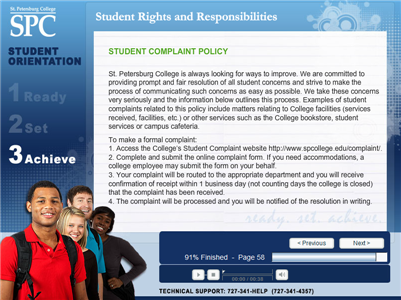

Procedures are
also published and disseminated to students by the following methods:
- Complaints Webpage
- SPC Student Handbook (online) or hard copies available at each campus.
- College Catalog (online)
- Board of Trustees Rules and Procedures Webpage (see above for direct links)
- MySPC online student portal as shown below:

- Course Syllabus Addendum - electronic document housed in the online learning management system for on-campus and online classes as shown below:

- Student's Rights to Know Webpage (under “Disputes & Appeal” tab, as shown below)
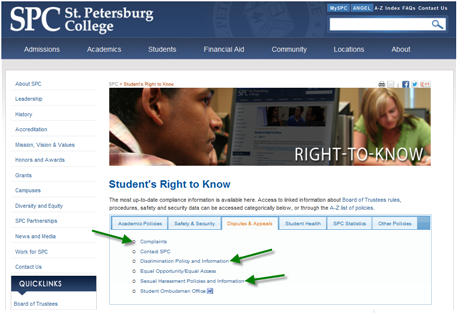
College
employees, particularly those who work directly with students (e.g.,
faculty members, advisors, student services
staff) are apprised of procedures via the Faculty
Manual,
Syllabus Addendum, and meetings with their supervisors, who inform
and train staff on details of the procedures, and how to use the
College’s online student complaint process and repository.
The Faculty Manual:

Evidence of Following Procedures/Record-Keeping & Tracking
Records of complaints, appeals, and grievances are maintained and tracked electronically in a centralized, College-wide, restricted-access repository in SharePoint site as shown below:

Records of complaints (academic and non-academic) are maintained solely in the electronic repository.
Records of the initiation of appeals (academic or non-academic) are maintained in the electronic repository. Follow-up documentation is kept locally at the originating campus.
Records of the initiation of grievances including discrimination grievances and sexual harassment grievances are maintained in the electronic repository. Due to the sensitive nature of the matters, follow-up records and documentation are kept in case files located in the General Counsel’s Office or the Equal Access/Equal Opportunity Office.
The initiating electronic record includes: student name and ID number, contact information, date the complaint was filed, subject of the complaint, program or department to which the complaint refers, category of the complaint (academic or non-academic), and details regarding the complaint. Follow up information includes the complaint status (in progress or resolved), supporting documents, and the resolution with a copy of the college administrator’s response as shown below:


Access to the electronic repository is restricted; it is not made public and only classified employees gain access by logging in with their College username and password. Records of complaints, appeals, and grievances are maintained for three years from the time the complaint was lodged. After three years, records are retained in accordance to the state records retention requirements.
Types of Complaints, Appeals, and Grievances
St. Petersburg College is committed to providing students with a prompt and fair resolution to address concerns. When necessary and appropriate, meetings with distance education students are accomplished via telephone or telecommunications technologies.
Student concerns fall into the following categories:
- Complaints: Complaints may be academic or non-academic in nature and focus on dissatisfaction with a facility, service, or product provided by the College. They are filed with the Associate Provost on the appropriate campus, who redirects the complaint to the correct College Administrator. All record keeping is maintained in a shared College electronic repository and is overseen by the Senior Vice President of Student Services.
- Appeals: Appeals may be academic or non-academic in nature and are a formal request asking for a change in a decision made. They occur after a student has had an action taken against them by the College that they deem unfair or in violation of their rights. Academic appeals are filed with the appropriate Dean and overseen by the Senior Vice President of Instruction and Academic Programming. Non-academic appeals are filed with the appropriate Associate Provost and overseen by the campus Provost. Initiating records of appeals appear in the electronic repository or may go directly to the appropriate campus/academic administrator. Record keeping is currently maintained on individual campuses.
- Grievances: A grievance is an action where an individual alleges that his or her rights have been violated without rational basis or done in bad faith. Academic grievances are filed with the Dean’s Office, and non-academic grievances are filed with the Associate Provost’s Office. Special grievances focus upon discrimination and sexual harassment. Discrimination grievances are filed through the Equal Access/Equal Opportunity Office. Sexual harassment grievances are overseen by the General Counsel’s Office. Initiating records may appear in the complaints electronic repository, but these offices maintain all follow-up record keeping.
Complaints
The Student Complaint Resolution Process Procedure is used when an individual expresses dissatisfaction with a facility, service, or product provided by the College. Examples can range from an experience with or treatment by a College employee to a matter relating to College facilities (e.g., buildings, parking lots), academics (e.g., classroom issues, library/learning support), student services (e.g., advising, student activities), or auxiliary services (e.g., bookstore, cafeteria).
The College addresses student complaints by providing students a process for communicating concerns as easily as possible. The Complaints webpage (shown below) includes a link to the procedure and to the Online Complaint Submission Form. The Complaints Webpage is linked from every page of the College Website, both on the left menu and at the bottom.
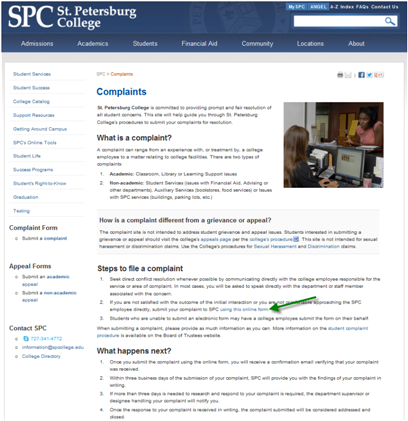
A student lodges a complaint by completing the online Complaint Submission Form. The online form is the primary method for receiving student complaints, therefore students are referred to the online form when they call or email staff regarding a complaint. A College employee may also submit a complaint form on behalf of students who require accommodations or who are unable to utilize the online form.
Once a complaint is submitted via the online form, the student receives an automated confirmation of receipt, a new record is created in the electronic repository including details about the complaint, and details about the complaint are sent electronically to the appropriate Campus Associate Provost. The Campus Associate Provost then forwards the complaint to the appropriate College administrator of the identified department or program.
Within three business days from receipt of the complaint, the College administrator completes a thorough review of the complaint and responds in writing to the student. After responding to the student, the administrator uploads supporting documents or artifacts regarding the complaint to the electronic repository and updates the complaint status as “in progress” or “resolved.”
To ensure that the procedure is followed within the time constraint outlined, the administrator receives an automated email message from the electronic repository on the second business day reminding the administrator of the time available to complete the review and respond to the student. The Senior Vice President of Instruction and Academic Programming and the Senior Vice President of Student Services manage the timely acknowledgement and response to student complaints and are notified by the electronic repository when there are outstanding complaints that have not been answered within the allotted timeframe. When necessary, the Senior Vice Presidents will follow-up with the appropriate administrator(s).
Academic Complaint Example


Non-Academic Complaint Example


Appeals and Grievances
The Student Grievances and Appeals Procedure is used when a student alleges that his or her rights have been abridged by any alleged arbitrary or capricious action or decision. The term “arbitrary or capricious” means without rational basis, done in bad faith, or constitutes disparate treatment and/or based on unlawful discrimination. The SPC Appeals website provides students information on how to initiate this process.
Academic Appeals
Academic appeals regard the awarding of final grades and/or related academic matters, or student requests to change from audit to credit. Academic appeals are processed by the appropriate Dean or Program Administrator.
Before filing a formal academic appeal, the student must first attempt to resolve the issue directly with the employee in the department or course faculty directly responsible for the service or department of instruction. If the matter is not resolved during the informal process, the student can seek formal resolution through the Dean’s Office by submitting a grievance or appeal using the Online Academic Appeal Form (this was previously handled through paper forms as seen below). The Dean/Program Administrator forwards the appeal to the Student Academic Appeals Committee, and a hearing is scheduled by the Committee Chair, consisting of faculty and staff not associated with the situation being presented. The Committee reviews evidence presented, and renders a decision by majority vote. The Committee Chair communicates the Committee’s decision to the student in writing. If the student is not satisfied with the Committee’s decision, he/she can appeal to the Dean/Program Administrator. The Dean/Program Administrator reviews the evidence of the appeal, renders a decision, and notifies the student in writing. The decision of the Dean/Program Administrator is final. Records of academic appeals are maintained in the Dean/Program Administrator office.
Academic Appeal Example

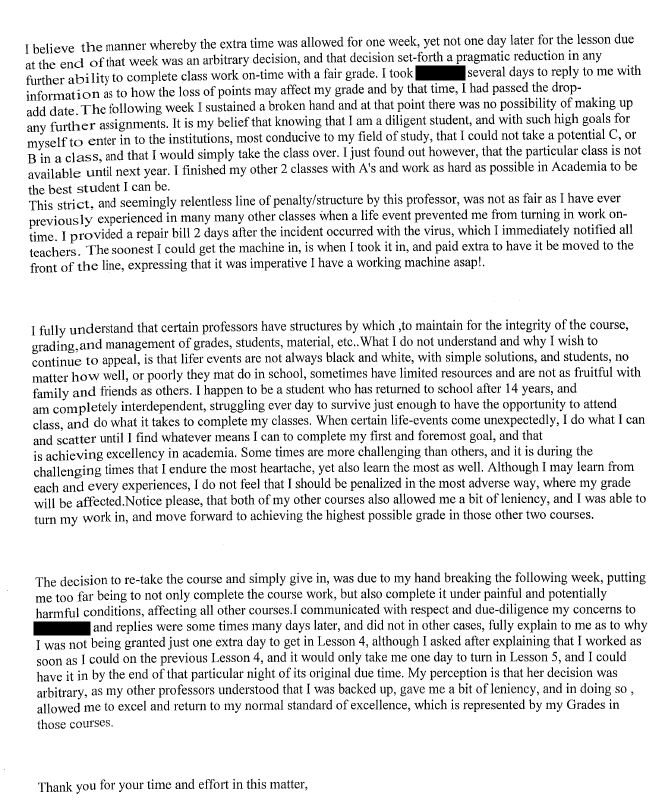

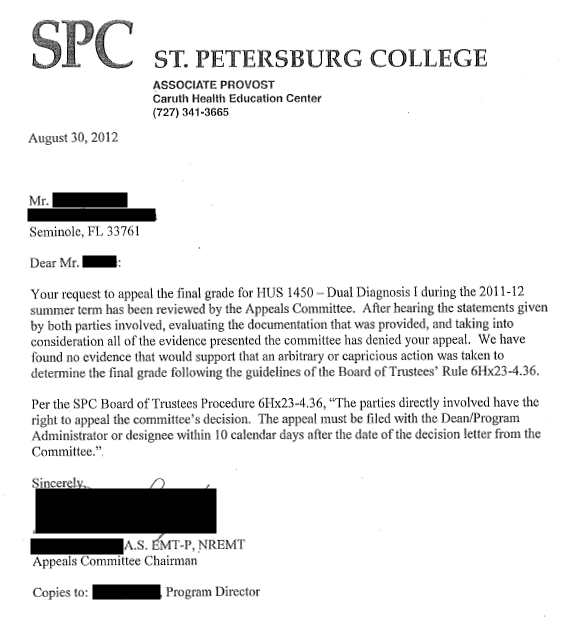
Non-Academic Appeals
Non-Academic appeals regard student violation of College Rule/Procedure, admission or re-admission, or withdrawal for non-academic reasons. Non-Academic Appeals are processed by the appropriate Campus Associate Provost.
Before filing a formal academic appeal, the student must first attempt to resolve the issue directly with the employee in the department or course faculty directly responsible for the service or department of instruction. If the matter is not resolved during the informal process, the student can seek formal resolution by submitting the Online Non-Academic Appeal Form (previously handled by a paper form as seen in the example below). Once an appeal is submitted via the online form, the appeal is received electronically by the Associate Provost where the alleged abridgment of the student’s rights took place.
The Associate Provost consults with the Department Administrator of the area involved in the appeal or grievance. A full investigation is conducted by the Associate Provost. Once the investigation has concluded, the decision is provided to the student in writing. The response to the student includes a copy of the procedure, a letter outlining the appeal outcome, and the student’s rights and options (if applicable). If the student is not satisfied with the decision of the Associate Provost, the student may appeal the decision by submitting an appeal in writing to the Campus Provost. The Provost will review the Associate Provost’s decision, including the basis upon which the decision was made, and provide a decision in writing to the student. The decision of the Provost is final. Records of non-academic appeals are maintained in the Provost’s office.
Non-Academic Appeal Example
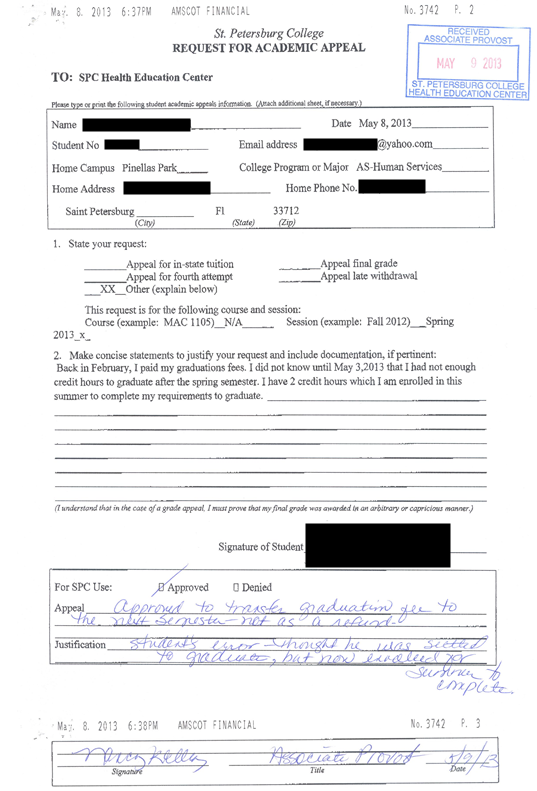
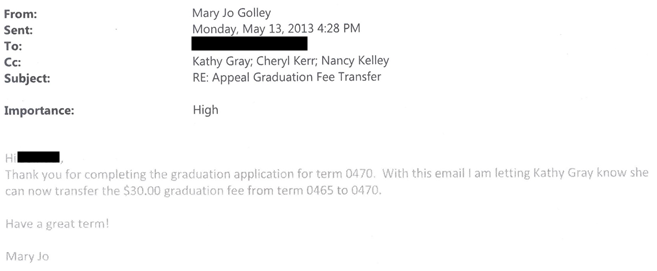
Discrimination Grievances
The Discrimination Grievance Procedure is used to provide an avenue through which issues and claims related to discrimination based on protected class and/or disability are addressed and resolved at the earliest possible juncture. It allows for both an informal and formal process through which allegations and claims may be presented free from coercion, interference, restraint, discrimination, or reprisal in order to give students adequate opportunity to resolve the charges. Details and methods for reporting a discrimination grievance is provided to students via the “RESPECT” poster, which is posted College-wide and the Discrimination Webpage.
If a discrimination grievance is reported, all attempts are made to reach a satisfactory resolution through an informal process before proceeding through the formal process. The student completes and submits the Informal Discrimination Inquiry Form to the Equal Access/Equal Opportunity (EA/EO) Office to initiate the informal process. The EA/EO Officer then starts a case file to collect information, schedule meetings, and manage the process to resolve the dispute informally. If a dispute can be resolved by mutual agreement, and as deemed necessary, a Mutual Resolution of Dispute Form may be signed by the parties.
If the dispute cannot be resolved informally, then the student may submit a formal complaint through the EA/EO Office in accordance with the Discrimination Grievance Procedure. Records of discrimination grievances are maintained in the EA/EO Office.
Discrimination Sexual Harassment Complaint Example (note these examples are shown as summaries of the case file due to the sensitive nature of the documents)
Sexual Harassment Grievances
The Sexual Harassment Policy is used to address allegations of sexual harassment. Details and methods for reporting a sexual harassment grievance are provided to students via the “RESPECT” poster posted College-wide and the Sexual Harassment Webpage.
Sexual harassment allegations are referred immediately upon receipt to the General Counsel’s Office, who has responsibility for directing an investigation. Upon completion of the investigation, the results are submitted to the College President or his/her designee for determination of what action, if any, is appropriate. The sexual harassment grievance may be resolved by intervention, corrective action taken by the College President, or by official disciplinary procedures. The student is advised in writing of the outcome of the investigation.
Sexual Harassment Complaint Examples (note these examples are shown as summaries of the case file due to the sensitive nature of the documents)
Supporting Documentation
In order to preserve the integrity of the supporting documentation in case of updates occurring between the submission of this document and the review, the narrative above links to pdf versions, whereas live links are included below.
- SPC BOT Student Complaint Resolution Process Procedure P6Hx23-4.363
- SPC BOT Student Grievances and Appeals Rule 6Hx23-4.36
- SPC BOT Student Grievances and Appeals Procedure P6Hx23-4.36
- SPC BOT Discrimination Grievance Rule 6Hx23-1.34
- SPC BOT Discrimination Grievance Procedure P6Hx23-1.34
- SPC BOT Sexual Harassment Policy 6Hx23-2.011
- Online New Student Orientation
- Complaints Webpage
- Student Handbook
- College Catalog
- Board of Trustees Rules and Procedures
- MySPC Student Portal
- Course Syllabus Addendum
- Student's Rights to Know Webpage
- Faculty Manual
- Online Complaint Submission Form
- SPC Homepage
- Appeals Website
- Online Academic Appeal Form
- Online Non-Academic Appeal Form
- “RESPECT” Poster
- Discrimination Webpage
- Informal Discrimination Inquiry Form
- Equal Access/Equal Opportunity (EA/EO) Office
- Mutual Resolution of Dispute Form
- Discrimination Sexual Harassment Complaint Example
- Sexual Harassment Webpage
- Sexual Harassment Complaint Examples
